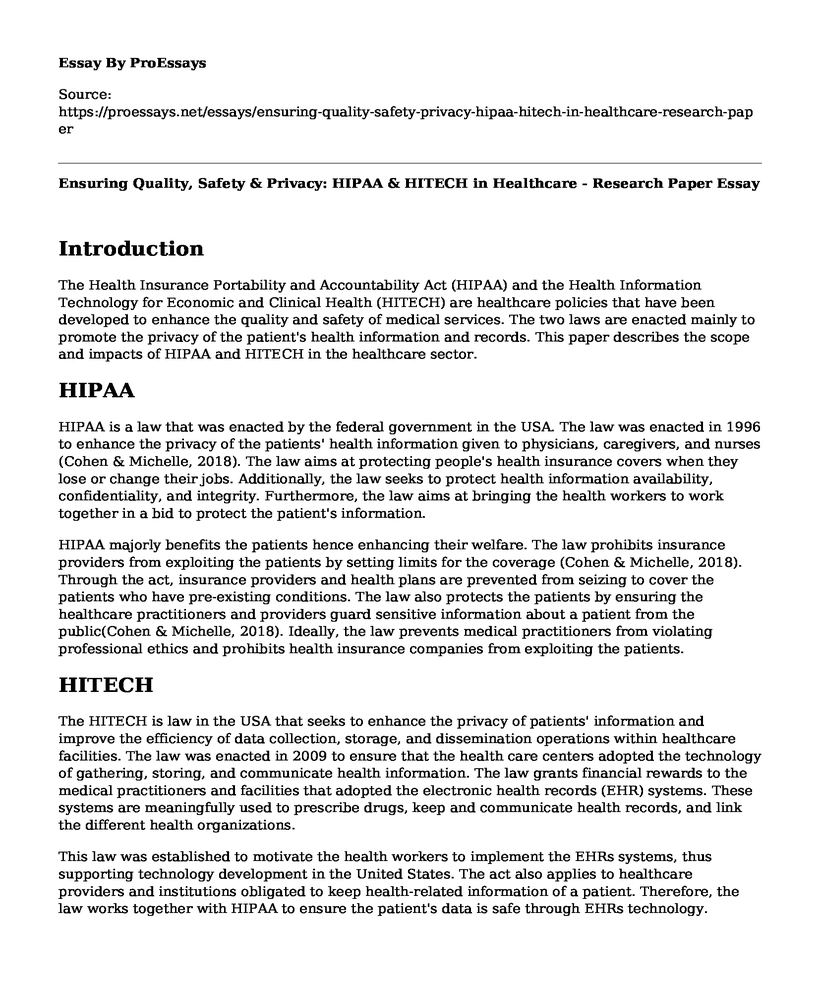Introduction
The Health Insurance Portability and Accountability Act (HIPAA) and the Health Information Technology for Economic and Clinical Health (HITECH) are healthcare policies that have been developed to enhance the quality and safety of medical services. The two laws are enacted mainly to promote the privacy of the patient's health information and records. This paper describes the scope and impacts of HIPAA and HITECH in the healthcare sector.
HIPAA
HIPAA is a law that was enacted by the federal government in the USA. The law was enacted in 1996 to enhance the privacy of the patients' health information given to physicians, caregivers, and nurses (Cohen & Michelle, 2018). The law aims at protecting people's health insurance covers when they lose or change their jobs. Additionally, the law seeks to protect health information availability, confidentiality, and integrity. Furthermore, the law aims at bringing the health workers to work together in a bid to protect the patient's information.
HIPAA majorly benefits the patients hence enhancing their welfare. The law prohibits insurance providers from exploiting the patients by setting limits for the coverage (Cohen & Michelle, 2018). Through the act, insurance providers and health plans are prevented from seizing to cover the patients who have pre-existing conditions. The law also protects the patients by ensuring the healthcare practitioners and providers guard sensitive information about a patient from the public(Cohen & Michelle, 2018). Ideally, the law prevents medical practitioners from violating professional ethics and prohibits health insurance companies from exploiting the patients.
HITECH
The HITECH is law in the USA that seeks to enhance the privacy of patients' information and improve the efficiency of data collection, storage, and dissemination operations within healthcare facilities. The law was enacted in 2009 to ensure that the health care centers adopted the technology of gathering, storing, and communicate health information. The law grants financial rewards to the medical practitioners and facilities that adopted the electronic health records (EHR) systems. These systems are meaningfully used to prescribe drugs, keep and communicate health records, and link the different health organizations.
This law was established to motivate the health workers to implement the EHRs systems, thus supporting technology development in the United States. The act also applies to healthcare providers and institutions obligated to keep health-related information of a patient. Therefore, the law works together with HIPAA to ensure the patient's data is safe through EHRs technology.
HITECH law prohibits medical practitioners from exposing the patient's health information for malicious use. Therefore, the act actively motivates health care providers to embrace technology. Additionally, the law protects the privacy of the patients by ensuring their information is recorded in computerized systems for easy and limited access (Mennemeyer, 2016). Additionally, the law oversees the funds for the EHRs and ensures they are used appropriately for the intended purpose. Furthermore, the law provides that the patients have non-limited access to information on their health (Gold & McLaughlin, 2016). Primarily, the HITECH law significantly impacts the quality of healthcare by safeguarding the personal and health information of the patients.
Conclusion
HITECH and HIPAA are thereby crucial acts in the US constitution. These laws promote the quality and safety of healthcare services in medical institutions. The laws are enacted to protect patients from exploitation by healthcare insurance organizations. The laws also ensure the patient's personal and health information is protected, thus maintaining privacy. Ideally, the two acts are implemented to protect the welfare of the patients and improve healthcare services.
References
Cohen, G., & Mello, M. (2018). HIPAA and protecting health information in the 21st Century. JAMA Network. 320(3), 231-232. Retrieved from https://jamanetwork.com/journals/jama/fullarticle/2682916
Gold, M., & McLaughlin, C. ( 2016). Assessing HITECH Implementation and Lessons: 5 Years Later. The Milbank Quarterly, 94(3), 654-687. Retrieved from https://www.ncbi.nlm.nih.gov/pmc/articles/PMC5020152/
Mennemeyer, S., Menachemi, N., Rahurkar, S., & Ford, E. (2016). Impact of the HITECH Act on physicians' adoption of electronic health records. Journal of the American Medical Informatics Association. 23(2), 375-379. Retrieved from https://academic.oup.com/jamia/article/23/2/375/2572425
Cite this page
Ensuring Quality, Safety & Privacy: HIPAA & HITECH in Healthcare - Research Paper. (2023, Apr 06). Retrieved from https://proessays.net/essays/ensuring-quality-safety-privacy-hipaa-hitech-in-healthcare-research-paper
If you are the original author of this essay and no longer wish to have it published on the ProEssays website, please click below to request its removal:
- Awareness of Light
- Advanced Pharmacology Paper Example
- Essay Sample on Hospitals: Improving Community Health Through Community Benefit Activities
- Paper Example on Congestive Heart Failure: A Growing Epidemic
- Peripheral Neuropathy & Diabetes: Prevention & Treatment Strategies for Nurses - Research Paper
- Transgender Poor Nutrition: Adverse Health Impacts & Inequalities - Essay Sample
- Elderly Care: Providing Services for Senior Citizens - Essay Sample







